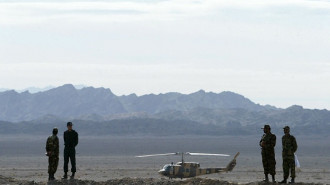Sudan doctors: 24 children, 9 women killed in Darfur clashes
A Sudanese doctor's union said Thursday that 24 children and nine women were among dozens killed in tribal clashes over the weekend between Arabs and non-Arabs in Sudan's western Darfur region.
The Sudan’s Doctors Committee also said that 23 elderly and 144 men were also killed. On Tuesday, Khamis Abdalla Abkar, the provincial governor of West Darfur province, said that the death toll had surpassed 200.
The committee, an independent doctors association, said that the actual death toll may be higher, as the count does not include casualties that were not subjected to autopsy or were not even reported.
The fighting, some of the deadliest in the region in recent years, grew out of the killing of two Arab herdsmen last Thursday just outside Kreinik, 80 kilometers (around 50 miles) east of Genena, the provincial capital of West Darfur.
Large numbers of Arab militias, known as janjaweed, then reportedly stormed the town in retaliation early Sunday with heavy weapons. The violence eventually reached Genena and the main hospital was attacked and then closed.
Meanwhile, several smaller private hospitals have opened their doors to receive some of the more than 220 wounded, according to the doctor's group. "However, these hospitals could not fill the gap created by the closure of Genena hospital," it said.
The World Health Organization said Thursday that two health workers, one in Kreinik and another in Genena, were among those killed. In a statement, the UN's health agency condemned the attacks on healthcare facilities and called for the immediate cessation of violence.
"Health care workers providing life-saving care to injured civilians are already overwhelmed and should not be at risk of intimidation or attack," said Ahmed Al-Mandhari, WHO's regional chief.
The agency added that the clashes had forced thousands of newly displaced civilians in Kreinik to seek refuge within the town’s military compound.
The fighting has come at a critical time for Sudan, which has plunged into chaos since a military coup last year. The takeover upended the country’s transition to democracy after a popular uprising forced the removal of longtime autocrat Omar al-Bashir in April 2019.
The Sudanese military said earlier this week that it had deployed a brigade to the province to join a civilian protection force already stationed in Kreinik. However, the clashes raise questions over whether military leaders are capable of bringing security to Darfur, which has been wracked by years of civil war. In 2020, the UN Security Council ended its peacekeeping mission there.
The Darfur conflict began in 2003 when ethnic Africans rebelled, accusing the Arab-dominated government in the capital of Khartoum of discrimination. Al-Bashir’s government was accused of retaliating by arming local nomadic Arab tribes and unleashing the janjaweed on civilians there — a charge it denies.
Al-Bashir, who has been in prison in Khartoum since he was ousted from power in 2019, was indicted over a decade ago by the International Criminal Court for genocide and crimes against humanity perpetrated in Darfur.

![Palestinians mourned the victims of an Israeli strike on Deir al-Balah [Getty]](/sites/default/files/styles/image_684x385/public/2024-11/GettyImages-2182362043.jpg?h=199d8c1f&itok=xSHZFbmc)


![The law could be enforced against teachers without prior notice [Getty]](/sites/default/files/styles/image_684x385/public/2178740715.jpeg?h=a5f2f23a&itok=hnqrCS4x)
 Follow the Middle East's top stories in English at The New Arab on Google News
Follow the Middle East's top stories in English at The New Arab on Google News
![Fakhrizadeh [AFP] Fakhrizadeh [AFP]](/sites/default/files/styles/image_330x185/public/media/images/774C39F7-8F7A-4D67-B998-27D102FCB4A7.png?h=d1cb525d&itok=j9eGvunV)

